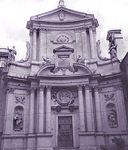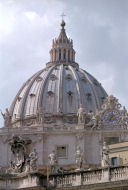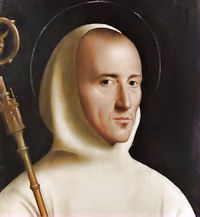Lent: April 1st
Wednesday of the Fifth Week of Lent
Other Commemorations: St. Hugh of Grenoble, Bishop (RM)
» Enjoy our Liturgical Seasons series of e-books!
"Everyone who exalts himself will be humbled, and the one who humbles himself will be exalted." (Lk. 18:14) "Even if we should have mounted to the very pinnacle of virtue, let us consider ourselves last of all; having learned that pride is able to cast down even from the heavens themselves him who takes not heed, and humbleness of mind to bear up on high from the very abyss of sins him who knows how to be sober. For this it was that placed the publican before the Pharisee." — St. John Chrysostom
Meditation- Lord, You Are All We Need!
For all of us life has its trials when the 'sea' on which we are sailing becomes stormy and waves threaten to submerge us and we, in the boat with the sleeping Jesus, cry out, as the apostles did, to wake Him "Master, do you not care. We are lost?” (Lk. 8, 24 and Mk 4, 38). Hearing the cry Jesus stands up and at his commands the wind and the sea are calmed. But he rebukes the apostles for their lack of faith: “Why are you so afraid? Have you still no faith?” (Mk 4, 40).
Jesus teaches us that no one and nothing, should weaken our trust in Him, if we intend to be his disciples. And trials or tests, in pedagogy and with God, are of inestimable value because they fortify the Christian's most precious gift, faith.
Trials are an opportunity for us to demonstrate our trust in God, to show that our act of faith professed in words is an act of the heart and the will, an act of total acceptance of the providence God who does not spare us trials but turns them into grace.
To experience that we are capable of persevering if we are with Jesus, is one of the most beautiful experiences of Christian life and it prompts us to praise God who always frees us, even though sometimes the ways and means he uses are beyond our imagination: “How can I repay the Lord for all his goodness to me? I will lift up the cup of salvation and call on the name of the Lord. I will fulfil my vows to the Lord in the presence of all his people. Precious in the sight of the Lord is the death of his saints. O Lord, truly I am your servant; I am your servant, the son of your maidservant; you have freed me from my chains. I will sacrifice a thank offering to you and call on the name of the Lord.” (Sal 116, 12-17).
God always gives us more than we ever hope for. To work his miracles he starts by enlarging our heart, preparing it for the immensity of Heaven, our final destination.
In times of trail God's presence is often silent and may seem absent, whereas in actual fact it in veiled behind the ineffable mystery of His almighty Love, which desires the good of those who love Him (Rom 8, 28). Only pride and arrogance can prevent God's love from working in us. Whereas humility in a believer who has complete trust in the love of the heavenly Father, makes miracles possible.
Happy the Christian who says in times of trial: Lord, I will not wake you even if everything around seems to be collapsing, because I am certain of your Presence. I am not worried about the waves and the wind, because you are with me, as you promised: “Lo, I am with you always, until the end of time” (Mt 28, 20). Yes, Lord, you are all we need!
The Blessed Virgin Mary lived with faith and complete and unconditioned trust in God, following her Son, Jesus of Nazareth, to Calvary, to Jerusalem, becoming similar to Him. In the heart of the Sorrowful Mother there was no doubt, at the foot of the Cross, amidst the tempest of history when all hell was unleashed against the Redeemer of the world to overcome Him and with Him all humanity. She did not 'cry out', she simply trusted in Jesus' promise that on the third day He would rise again (cfr. Lc 9, 22). Unlike the other women disciples, Mary did not run to the tomb, she knew it was empty.
May the Mother of our faith help us never to doubt the power of the Redemption, “the power of merciful Love”. The Church teaches us to entrust ourselves to Mary, always and especially at crucial times in life:
“To you O Mother I entrust the world and all its peoples, to you, to your maternal heart, I entrust the consecration of the world.O Immaculate Heart! Help us to conquer evil rooted deeply in the hearts of men today which has immeasurable effects on the present day and threatens to close the path to the future!
Save us from famine and from war!Save us from nuclear war, from all war, incalculable self-destruction!
Save us from sins against human life from its beginnings!Save us from hatred and scorn for the dignity of the children of God!
Save us from all injustice, social, national and international!
Save us from trampling God's commandments!
Save us from attempts to obscure the truth of God in human hearts!
Save us from losing awareness of good and evil!
Save us from committing sins against the Holy Spirit!
Hear O Mother of Christ, the anguished cry of suffering arising from all peoples! Charged with the suffering of whole societies!
Help us to overcome, with the power of the Holy Spirit, all kinds of sin: sins of men, sins of the world, all sin.
May the infinite salvific power of the Redemption, the power of merciful Love, show itself once again! May evil stop! May hearts be converted! May your Immaculate Heart offer everyone the light of Hope!” (John Paul II, Act of Consecration, 25 March 1984). (Agenzia Fides 5/2/2009; righe 63, parole 955)
— Ave Maria by Mgr. Luciano Alimandi
Things to Do:

The Station today is at the church of St. Marcellus at the Corso. Legend claims that Pope St. Marcellus (308-309) was sentenced by Emperor Maxentius to look after the horses at the station of the Imperial mail on the Via Lata, where the Via del Corso now lies. He was freed by the people, and hidden in the house of the Roman lady Lucina (see also San Lorenzo in Lucina). He was rearrested, and imprisoned in the stables.
Meditation: The Octave of Easter
The idea of celebrating a feast for eight days, or of keeping its memory on the eighth or octave day, was common among the Jews, and there is frequent mention in the Old Testament of a feast with an octave, so that we need not be surprised that Christians have adopted this, as well as many other customs of the Mosaic Law.
Undoubtedly, the feast of Easter was the first to be observed with an octave, among Christians; and each week-day of this octave has its own station and liturgy.
Two ideas determine the choice of the various [liturgical] texts. The greater number of them relate some incident of Our Lord’s resurrection, His meeting with the two disciples going to Emmaus, His appearance to St. Mary Magdalen, the speeches on the resurrection by St. Peter or St. Paul to the Jews. The antiphons of the Introit and other chants, the Collects, and various prayers remind the neophytes, baptized during the Paschal Vigil, that the Lord has bought them with a great price, that He has led them into a new country, a land flowing with milk and honey, and they have become a new people, populus acquisitionis, a people purchased by God Himself, His own people, called from the shadow of darkness to the fullness of light, who hereafter must live in peace and in joy. It is the call of the Gentiles in place of the Jews, a favorite theme in the liturgy. All this instruction must not find us indifferent as though its application were only to the neophytes of long ago. We, too, have been baptised and therefore these lessons are all applicable to us.
During this Octave, then, we have a kind of anthology of the resurrection, showing it to us in all its different aspects, and completing the Paschal liturgy. Baptism, according to St. Paul’s sublime doctrine, is also a resurrection, a rising from the death of sin to a new life. We shall find this idea recurring again and again in the Easter Octave. Hardly anywhere in the liturgical cycle shall we find such striking unity of thought, and nowhere do all the prayers combine so well to emphasize and develop the main thesis.
—Excerpts from The Year’s Liturgy by Fernand Cabrol, OSB
Meditation: An Introduction to Easter
Easter is the Solemnity of Solemnities, the center and climax of the Church year. All the mysteries that we have commemorated from Advent until now have pointed toward Easter; all that we shall yet celebrate in the weeks that follow has its foundation in the mystery of Easter, and receives its meaning and importance from this mystery.
The resurrection of Christ is the consummation of the Incarnation (the Christmas mystery) and of the Passion. St. Paul reveals the meaning of Easter when he writes to the Corinthians, “And if Christ be not risen again, your faith is vain, for you are yet in your sins. Then they also that are fallen asleep in Christ are perished.” (1 Cor 15:17f.). Even the Incarnation and the Passion are not sufficient in themselves. “He was delivered up for our sins” the Apostle tells us (Rom 4:25), that is, to deliver us from the death of sin. But it is not enough to be delivered from death. We stand in need of life, the full and everlasting life of God. It was that He might give us this life that He arose from the dead, “and [He] rose again for our justification” (Rom 4:25). He arose that He might communicate to us that perfect life that He had earned for us through His death, and which was first seen in Him, the “first fruits of them that sleep” (1 Cor 15:20). Through the paschal mysteries the Church and mankind itself enter with Christ its head into the glorified life. We had been created for this life from the very beginning. But we lost our right to that life through Adam’s sin. Through the resurrection of Christ we have regained our right to it. This is the source of all the joy of Easter and for the continual heartfelt alleluias. Mankind has been restored in Christ, has been delivered from all sin, and has regained possession of eternal life. By possessing this new life given us at Easter we already begin to participate in the eternal and unending life of heaven. The oration [Collect] of the Easter Sunday prays: “O God, who on this day through Thine only-begotten Son hast overcome death, and opened unto us the gate of everlasting life; do Thou follow with Thine aid the desires which Thou dost put into our minds, and by Thy continual help bring the same to good effect.” Over and over again the liturgy of Easer reminds us that in the present celebration of the Easter mysteries we begin to possess in truth the life of heaven. “I live, and you shall live.”
The joy of Easter finds its natural expression in the joyous banquet of Holy Communion, the Easter banquet, the paschal meal. Holy Communion is the food upon which this new life is nourished. He who rose from the dead enters our soul in person, and illuminates it with the fullness of His new life. What He is, we are also; as He rose from the dead, so shall we rise. We now walk “in the newness of life” (Rom 6:4).
2. The spirit of Eastertide is a spirit of sincere gratitude to the risen Christ, through whom we possess eternal life. “I live, and you shall live.” We should acquire this spirit of joy, a spirit which will lift us above sin and the world and death. The risen Christ will give us the strength to overcome the powers of darkness and death. We must have a spirit of hope. We shall, since Christ rose, most certainly rise on the last day, and our bodies shall be awakened to eternal life. “I shall not die, but life.” We should have an unshakeable faith, for Christ arose from the dead. His resurrection attests His divinity and the truth of His doctrine.
Easter sets a new task before us. We must now begin to live the life of the new man. We rose with Christ in baptism. “If you be risen with Christ, seek the things that are above, where Christ is sitting at the right hand of God. Mind the things that are above, not the things that are upon the earth. For you are dead [to the world, to sin, to temporal things], and your life is hidden with Christ in God” (Col 3:1-3). “Purge out the old leaven, that you may be a new paste, as you are unleavened…Let us feast, not with the old leaven…of malice and wickedness, but with the unleavened bread of sincerity and truth” (1 Cor 5:7 f.) Daily during the Easter season the liturgy reminds us, both in the Mass and in the Divine Office, of the words of the Apostle: “Christ, rising again from the dead, dieth now no more.” He died to sin once for all; He lives now for God (Rom 6:9f). Christ, the whole Christ (the Church, all of us), now lives for God.
We are the “Christ” who is risen. We died to sin in baptism. We live now for God. “Christ, rising again from the dead, dieth now no more.” We have put an end to our sinning, and we live now only for God and for the performance of His Holy will. “Our conversation is in heaven” (Phil 3:20). We must acquire a spirit of self-denial, and be willing to carry the cross of Christ. We can share in the life of the risen Christ only if we have been willing to share His humiliation and crucifixion.
3. The time from Easter to Pentecost is merely an extension of the feast of Easter, forming a continuous, uninterrupted Easter feast. In various forms recure thoughts that deal primarily with Christ’s resurrection and our call to share His new life with Him. “I live, and you shall live” (John 14:19).
The period from Pentecost to Advent also bears a close relationship to Easter. It will develop and perfect the life which was given to us at Easter. Christ lives in us, and we live in Him. He lives on in His members; and we, the members, share His life. He lives in our body as well as in our soul, for the body, too, shall rise and be restored to life and share the life of Christ in the blessed Easter of eternal life. “I believe in the resurrection of the body and life everlasting. Amen.
—Benedict Baur, OSB, The Light of the World
 Monday in the Octave of Easter
Monday in the Octave of Easter
Station with San Pietro in Vaticano (St. Peter's in the Vatican):
At Rome, the Station for today is at the basilica of St. Peter. On Saturday, the catechumens received the Sacrament of regeneration in the Lateran basilica of our Savior; yesterday, they celebrated the Resurrection in the magnificent church of St. Mary; it is just that they should come, on this third day, to pay their grateful devotions to Peter, on whom Christ has built his whole Church.
For more on San Pietro in Vaticano, see:
For further information on the Station Churches, see The Stational Church.








